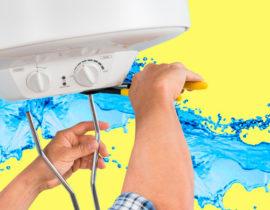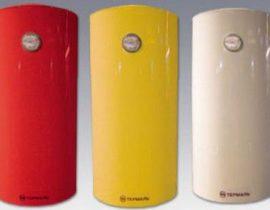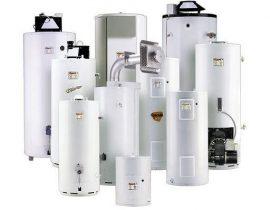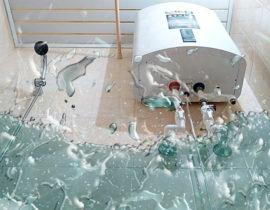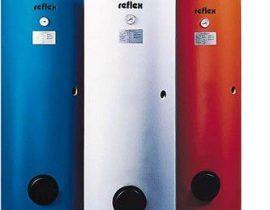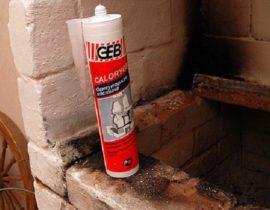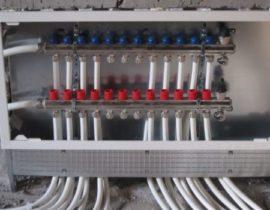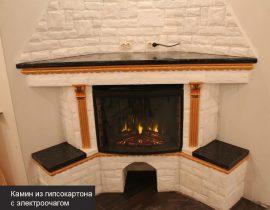Having hot water at the tap is no longer a luxury. And if not everyone has a central water supply, then almost every house has boilers and instantaneous water heaters. The eternal dispute: what is better a boiler or a protochnik?
Each device for heating water has its own characteristics, as well as advantages and disadvantages. Therefore, the choice will depend entirely on the requirements and requests of customers. Let's compare these two water heaters on a number of parameters, so that it becomes clearer which one is right for you.
Content
Principle of operation and design features
Protochnik
Advantages:
- Unlimited hot water resource;
- It is included in the network only when a person needs it;
- Instantly heat water, no need to wait;
- Compact dimensions and ease of use.
Flaws:
- A small pressure of hot water, as the jet must have time to warm up before it leaves the mixer.
Boiler
Advantages:
- Long service life, the possibility of cleaning and replacing the heating element;
- Low electricity consumption;
- Safety of use;
- Keeps the water temperature at the same level;
- Limited resource of hot water, which depends on the volume of the tank.
Flaws:
- Large dimensions that are difficult to fit into modern bathroom layouts.
- Boiler is a storage tank in which there is a heating element. Inside the tank is sheathed with a layer of thermal insulation, which maintains the desired water temperature for a long time, saving electricity costs. After the water has cooled down a little or diluted with cold, the heating element automatically turns on.
- Instantaneous water heater inside it has more powerful heating elements, which are included in the network as soon as the hot water tap is opened. In a matter of seconds, warm water flows from the mixer, which can be used in unlimited quantities.
Boilers are more bulky, so many consider them a relic of the past, opting for a compact, but no less powerful instantaneous water heater.
Price and economy
The boiler is 2-3 times more expensive than an instantaneous water heater, but this is only if we are talking about large tanks. On average, their cost is about the same, but first of all it all depends on the brand and power. There are cheaper options for the home, and there are industrial water heaters. The price will of course vary.
As for savings, the boiler is more expensive, and here's why. Even if there are no people in the house and there is no hot water consumption, the tank is automatically connected to the network in order to maintain the set temperature. The water heater works after the fact: they opened the tap - electricity is consumed, there is no consumption - there are no electricity costs.
But even here the situation is ambiguous. If you need to quickly fill a bath of hot water, then the boiler will cope with the task faster, as it has a certain resource.A flowing water heater will have to work hard, especially if a large number of people live in the house.
And he will cope with his task only when there is a suitable voltage in the network. Accordingly, if failures often occur in your electrical network, and the voltage barely reaches 200 V, then it is more cost-effective to install a boiler.
Repair and service
From practice, it is worth noting that boilers become unusable more often than instantaneous water heaters, and here's why:
- The absence of a filter for cold water, which leads to clogging of the tank with silt and debris. It accumulates and settles on the heating element, reducing its productivity.
- There is no proper maintenance of the tank.
- The lack of a correctly selected mode of operation of the boiler, in which it constantly works, and there is practically no hot water consumption.
All these factors sooner or later lead to failure. And if instantaneous water heaters are less prone to scale formation and retention of solid particles, then boilers do just that.
On average, the life of the boiler is 5-8 years, and with scheduled cleaning and timely replacement of the magnesium anode, they can “live” up to 10 years. Water heaters will easily step over this mark, without straining a person with the need for such frequent cleanings.
As for the burnout of the heating element, the instantaneous water heater has a much higher chance of failing during power surges in the network. Experts recommend connecting this device to the network through a voltage stabilizer to reduce the risk of breakdown.
In repair and maintenance, protochniks are much cheaper, and if a complete replacement is necessary, the exorbitant price will not hit the family budget.Again, everything is relative, since you can use the instantaneous water heater every second, and the boiler only occasionally. Accordingly, in the first case, there are more risks of early breakdowns and failure.
Water quality characteristics
Like it or not, but the tank is a tank and small debris will always accumulate in it. Hot water from the boiler is not recommended for cooking, as it may contain particles of settled sludge and scale. It is quite possible to take water from a flow heater if there is confidence that the city water utility is responsible for its quality.
Boiler:
- Water can smell like a lake
- Debris and scale particles appear, especially at high water heater temperatures
- Not suitable for cooking
Instantaneous water heater:
- Water does not have an unpleasant odor
- The water is as clean as pipes and the local water utility allow.
- Can be used for cooking
Power and connection features
The boiler in this regard is quite simple: they hung it on the wall, connected it to the water supply, gave it a network. You will have to tinker with the water heater. Yes, it is more compact and easy to hide under a sink or in a niche, but in order for it to work as smoothly as possible, a separate line will be required. Experts do not recommend connecting protochnik to ordinary sockets. This can cause an overvoltage of the line, which will lead to smoke.
When connecting to a dedicated line meter, it is best to use a separate machine, which, in which case, can automatically turn off the electricity supply. It is both more reliable and safer.
As for the water connection, it is necessary to allocate a separate entrance and exit for the boiler, and this is at least the soldering of plastic pipes, the installation of adapters and the connection of a flexible hose. Everything is simpler with protochnik, and some models can completely replace the mixer.
Selection rules
In order not to miscalculate and choose a really economical, high-quality and satisfying all needs equipment, decide on the following parameters:
- Installation location - is there a place for a bulky boiler in your bathroom or toilet, or would it be more comfortable to hide a small water heater in a niche?
- How often will hot water be used - if you have a large family, and hot water is consumed throughout the day, it is unprofitable to buy a boiler, since the water will run out quickly, and you will have to wait at least 2-3 hours to heat the next portion. The best option in this case is a flow-through water heater. And another option: the meaning of a bulky boiler, which is connected to the network every 7-10 minutes to maintain the set temperature, if hot water is only consumed once a day and in small quantities?
- Features of the electrical network in your home - if there are frequent power outages, planned and unscheduled shutdowns, and hot water is needed on an ongoing basis, then it is better to give your choice in favor of a boiler.
- Breakdown prevention - if you are ready to clean the boiler from silt and scale as required by the manufacturer, then you can safely buy it. If the work of such complexity is beyond your power, then it is better to use a flow-type water heater.
- The presence of a separate dedicated line for the water heater - if you plan to put a protochnik, then such a measure is simply necessary. For the boiler, it is enough to plug the plug into the socket.
A categorical answer to the question which is better, instantaneous or storage water heater, No. Everyone decides what to install, based on personal requirements and preferences. Before buying, carefully consider all the nuances and evaluate the feasibility and profitability of installing both instantaneous and storage water heaters. And some craftsmen combine these two devices and enjoy life in the truest sense of the word.
Video tips for choosing a water heater







